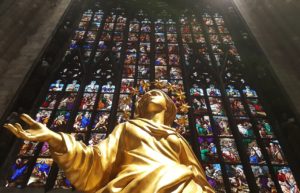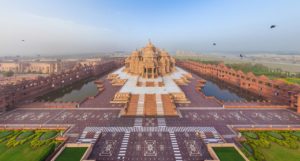“I don’t believe in God. I believe in something, just not in God”.
When questioned about their belief in God, a lot people seem to have a very narrow view of what God is supposed to be, inextricably linked to organised religion. When they cannot reconcile that narrow view with their own belief system they state that they do not believe in God and therefore have no relationship with the divine. That relationship may still be desired, as it could bring security, unconditional love, support at times of need and a sense of belonging, but it would constitute a lie to oneself and can therefore not be maintained. Many who claim they are non-believers however, are still left with the feeling that there is something bigger than ourselves, something they would like to connect to at some level, just not within the traditional context of organised religion.
As I see it, there are many ways to approach the concept of God and organised religion is just one of them.
Organised religion generally poses the personal God, usually male, an omnipotent (all powerful) being who rules the world and who, by allowing human beings the freedom of choice, also allows the existence of His Antagonist, the Devil. This God wants His subjects to come to Him of their own free will, but when they don’t, they will spend eternity in the flames of Hell. There is only one life and it must be lived by God’s rules. Within Christianity, there are ways of purging sins, through confession and true repentance, in which case an officially assigned representative of God can grant you forgiveness and cleanse your soul. If you can not get access to such a representative of God before you die, tough luck, you die and go to Hell whether you are repentant or not. Up until very recently, the Catholic church did not allow stillborn babies into heaven, they had to stay in ‘Limbo’ for eternity because they were not baptised before death. (‘Limbo’ is a place just outside Heaven, away from Hell but also away from the presence of God.)
I personally believe that this is a very limited view of God. This God is not omnipotent; there seem to be enormous shortcomings to his power if he is incapable to grant forgiveness to a repenting soul, without an intervening human representative (e.g. priest) acting on his behalf. This God is not omnipresent (present everywhere at the same time) either: he is absent in Limbo, absent in Hell for eternity and absent until access has been granted through baptism, again performed by an officially assigned human representative. Choice is relative, here: ‘you do as I say, or you will burn in Hell for eternity’. After death, this God refuses shelter to anyone who has not abided by his rules; the concept of forgiveness is pretty short lived. Access to heaven is, up to a certain point, simply luck of the draw. It is not granted on the basis of your contribution to the world as a caring, loving, non-judgemental human being, who is never afraid of helping out other people, and making right and just decisions, rather than ones driven by personal gain. This may play a part, but not the most important one. Access to heaven is gained mainly by baptism, worship on Sunday, by praying and reading your bible, by telling God you think he’s great, you love him and can’t live without him. So if you happen to be born in a place that has never heard of this God; if you die alone; if you cannot get access to one of those representatives before you die, who can grant forgiveness for your sins and cleanse your soul; if you die angry with God because you have been hurt and abused, you are not allowed to be with God. You go to Hell.
Life in this context is not a process of growing: it is a cruel and unfair test, with most people in this world seriously disadvantaged, or even incapable of passing, through circumstances beyond their control.
Organised religions are frameworks, encompassing theological theories about the nature of the divine, usually represented as absolute truths, and rules about approaching and incorporating the divine into one’s life, usually predicting dire consequences if these rules are not adhered to. The most important thing to understand about organised religions is that they have to keep their institutions alive and as such it is within their best interest to stipulate worship through their facilities, using their people. The need to be needed in order to survive must prevail, because otherwise, they will cease to exist. That is why giving money to religious institutions, in collects or as gifts, is considered a divine duty, why one can only receive true salvation through the institutions and why members are ordered to keep coming back, every morning in the past, and now, as most congregations are waning, at least once a week. Institutions, at their best, do wonderful things. Through them, wonderful people help other people in wonderful ways. But they remain organisations whose belief structures and divine rules are coloured by a need to survive.
I believe that the problem many people seem to have with the concept of God could be due to a failure of organised religions to move with the times, theologically. Many individual representatives of the churches do not subscribe to the idea of hell as they used to, nor to the idea of God as a vengeful, punishing force. Many even acknowledge the possibility of a relationship with God outside the confounds of church and traditional worship, but in essence, the churches still put forward an imposing patriarchal society in all aspects of religious life: a personal male God, benevolent father, head of the household, prescribing a framework of morals and lifestyle rules and restrictions as well as regular worship within religious institutions. The feminine is still entirely absent from the divine. Mary has never been granted divinity; she may be the ‘mother of God’ but she is still considered human. The archangels are male; Jesus is male. Nobody in this divine family has ever had sex because sex, although quite necessary for the survival of the human race (we can not all achieve ‘immaculate conceptions’), is still dirty and, at the heart of it, sinful. At the heart of most religious life is still worship, rather than love for one another in day to day life. Why would God care so much about being worshipped and thanked all the time? Does he have such a big ego?
Monotheism is the existence of a single omnipresent, omniscient (all knowing), omnipotent deity, or God. It is claimed that Christianity is monotheistic, but there are some problems with this claim. In practice we do not see an omnipotent and omnipresent God, as discussed earlier in this article. His omniscience is questionable also. Firstly, his perspective is limited by his sex: he is male and therefore lacks female perspective. (Although in the Old Testament this view of God as solely male is contradicted, e.g. Gen 5.1-2: … When God created man, he made them in the likeness of God. Male and female he created them, and he blessed them and named them Man when they were created.) Secondly, there are many occasions in the Old Testament where God asks questions in order to get answers, e.g Job 1.7 (To Satan:) “Whence have you come?” (God does not know where Satan came from) or: Gen 18.26: And the Lord said, “If I find at Sodom fifty righteous in the city, I will spare the whole place for their sake.” (God does not know how many righteous people live in Sodom). But even if we are to take the bible as written by fallible people, rather than God himself, it is still hard to sustain the notion that this God is truly monotheistic.
So why is this an issue at all? Well, it is an issue because there is an inherent contradiction in organised religion. We are told on the one hand that this God is omnipresent, omnipotent and omniscient, but on the other hand, the entire frameworks prescribed to us by organised religions tell us that he is none of these things. The theology limits God’s power, God’s understanding, God’s knowledge, God’s reach. The fact is, that many people who claim they ‘don’t believe in God but believe in something’ believe in God as something much more than that.
True monotheism, which Christianity claims to be but is not, encompasses a God that is truly omniscient, neither male nor female, and at the same time, both; a God that is truly omnipotent, who controls all and yet nothing because the world would run this way because there is no other way; a God that is omnipresent, who is all things and yet, nothing, because the very nature of being is already finite. This God is past, present and future, and all at the same time because this God is time and beyond time. This God is so all encompassing that we cannot escape it, no matter how ‘bad’ we are or how much we deny its existence. To deny this God would be to deny ourselves. This God does not need or demand worship, nor praise or prayer, because this God has no ego. Rather, we are the ones that need prayer, in order to connect back with what is true. Connecting to this God would mean connecting with what needs to be, to embrace life. Hell is merely an illusion, a state of denial, an absence, rather than an active force of being. Hell does not truly exists because God is omnipresent and therefore a place without God can not exist.
So in answer to the main question: does God exist, we might say this: the concept of God as an all-encompassing thing, or life itself in all shapes and forms, embraces any view of the world around us. There is no limit to what you can believe or disbelieve. We know so little and we are so little, in this world. One might say that angels and ghosts and fairies do not exist, because there is no ‘real’ proof. There is even less proof that they don’t exist. One might say that reincarnation is just an inability to accept that when we’re dead, that’s it, we’re really not that important. On the other hand, not believing it might just be an excuse not to learn what we need to learn, because if we don’t, we will have to in the next life. The existential doubt of the existence of God has always struck me as slightly odd. The sun rises every day, doesn’t it? You are breathing, aren’t you? Do you deny the existence of the universe, just because we can not measure it, just because we do not understand?
So what about that relationship with God? How can you connect to all these things at the same time, and why would you bother if you don’t believe in the grey man on the cloud?
Well, the answer is simple. You don’t have a relationship with God for God, that would be ridiculous. You have a relationship with God or ‘the divine’ for you, in order to find a moment of peace and tranquillity and in order to feel connected and in control in a very demanding, stressful world. Addressing God in those brief moments does not automatically mean you believe God is a man on a cloud. You could pray, you could talk to God when no one can hear you, write a letter to God, do yoga, meditate, take some quiet time of contemplation. You won’t be lying to yourself. You can have your theological cake and eat it. And at its best, maybe that is what organised religion manages to offer to some of us: an almostm tangible relationship with something that is ultimately beyond definition.





